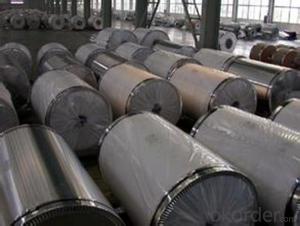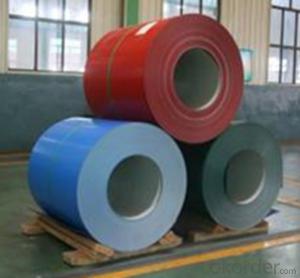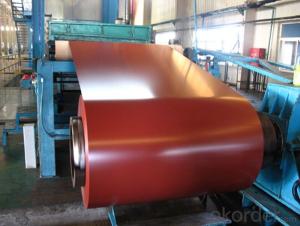Color Coated 3003 Aluminum Coil China Supply for Sale
- Loading Port:
- Shanghai
- Payment Terms:
- TT OR LC
- Min Order Qty:
- 5 m.t.
- Supply Capability:
- 10000 m.t./month
OKorder Service Pledge
OKorder Financial Service
You Might Also Like
Item specifice
1. Specification of Color Coated 3003 Aluminum Coil China Supply for Sale
Material | Alloy Aluminum 6063,6061,6005 or customer nominated |
Temper | T3, T4, T5, T6 |
Surface | Anodize, electrophoresis, powder coating, PVDF coating, wood grain painting, matted, etc. |
Colour | Any colour based on Standard Germany RAL Mark |
Length | Coating 6.5 meters, Anodizing 6.5 meters, Mill finish 5 meters |
Press Machine | 500-4000 tons all together 64 press lines. |
Fabrication | 1. Windows and doors; 2. Drilling; 3. Bending; 4. Cutting; 5. etc. |
Certificate | ISO 9001 |
Moulding | 1. Using our moulds, no fee; |
2. Using customer drawing, opening mould, usually about 10~50 tons then the moulding can be refunded. | |
3. Mould cost is negotiable base on the order quantity | |
Capability | Annual output 100,000 tons |
2. Application of Color Coated 3003 Aluminum Coil China Supply for Sale
(1).Interior: wall cladding, ceilings, bathrooms, kitchens and balconies, shutters, doors...
(2).Exterior: wall cladding, facades, roofing, canopies, tunnels,column covers , renovations...
(3).Advertisement: display platforms, signboards, fascia, shop fronts...
3. Feature of Color Coated 3003 Aluminum Coil China Supply for Sale
*Such coil is specially designed to replace aluminum ingot, due to the high export tax of aluminum ingot, the coil has better price than ingot.
*This type of coil can fit customer's remelting furnace just like ingot, no need to make any change to the production line that was previously used for ingot. The standard coil size and weight is very suitable for the feed gate of furnace.
*This type of coil causes less material wastage than ingot when remelted.
*Our coil is made directly from ore, no need to go though the ingot making process, quality is much better than other suppliers who use ingot scrap to make coil.
Be free from Oil Stain, Dent, Inclusion, Scratches, Stain, Oxide Dicoloration, Breaks, Corrosion, Roll Marks, Dirt Streaks and other defect which will interfere with use
4. Certificate:
SGS and ROHS(if client request, paid by client), MTC(plant provided), Certificate of Origin(FORM A, FORM E, CO), Bureau Veritas and SGS (if client request, paid by client), CIQS certificate
5. Image of Color Coated 3003 Aluminum Coil China Supply for Sale
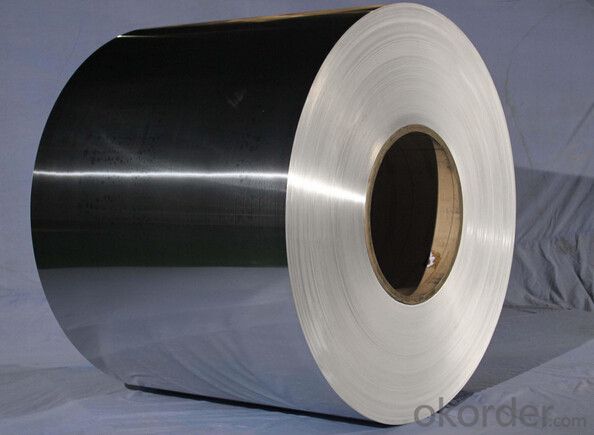
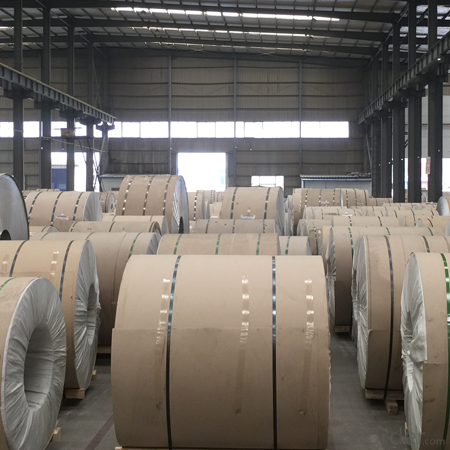
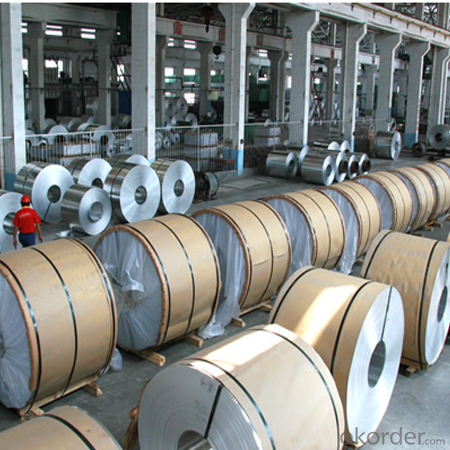
6. Package and shipping of Color Coated 3003 Aluminum Coil China Supply for Sale
eye to wall
eye to the wall
with wood pallet (wooded case also available)
7. FAQ
1) What is the delivery time?
Dpends on actual order, around 20 to 35 days
2)What is the QC system:
We have QC staff of 20 persons and advanced equipment, each production is with MTC traced from Aluminum ingot lot.
3) What market do you mainly sell to?
Australia, America, Asia, Middle East, Western Europe, Africa etc
- Q:Can aluminum foil coil be stores for a long time?
- It is ok within one or two years, but for five or six years, it will be oxidized.
- Q:What are the different coil coating options for aluminum coils?
- There are several different coil coating options available for aluminum coils, each offering unique benefits and characteristics. 1. Polyester: Polyester coil coatings are the most commonly used option for aluminum coils. They provide excellent durability and resistance to weathering, making them suitable for outdoor applications. Polyester coatings also offer good color retention and are available in a wide range of colors and finishes. 2. Polyvinylidene Fluoride (PVDF): PVDF coatings are known for their exceptional performance and durability. They have excellent resistance to UV rays, chemicals, and extreme weather conditions. PVDF coatings also provide outstanding color retention and maintain their appearance for a longer period of time, making them ideal for architectural applications. 3. Polyurethane: Polyurethane coatings offer a high level of resistance to abrasion, chemicals, and corrosion. They provide good adhesion and flexibility, allowing for easy forming and bending of the coated aluminum. Polyurethane coatings are often used in industrial applications where durability and protection are crucial. 4. Silicone-modified Polyester (SMP): SMP coatings combine the benefits of both polyester and silicone coatings. They offer excellent resistance to fading, chalking, and environmental pollutants. SMP coatings provide good flexibility and adhesion, making them suitable for a wide range of applications. 5. Epoxy: Epoxy coatings are known for their excellent adhesion and corrosion resistance. They provide a hard, durable finish that is resistant to chemicals and abrasion. Epoxy coatings are commonly used in industrial settings where harsh conditions are present. 6. Plastisol: Plastisol coatings are typically used in applications that require a textured or decorative finish. They offer good flexibility and impact resistance. Plastisol coatings can be customized with various patterns and textures to enhance the appearance of the coated aluminum. Overall, the choice of coil coating option for aluminum coils depends on the specific requirements of the application, such as the desired level of durability, weather resistance, color retention, and appearance. It is important to consider these factors when selecting the most suitable coating option for your aluminum coils.
- Q:Are there any health concerns associated with aluminum coils?
- Aluminum coils, commonly used in HVAC systems and refrigerators, have been a subject of health concerns due to the possible release of aluminum particles into the air or food. However, studies have consistently shown that the amount of aluminum released from these coils is typically very low, posing no significant health risks. Although aluminum is known to be a neurotoxin, exposure to aluminum coils generally remains well below the harmful threshold. The World Health Organization (WHO) has established a provisional tolerable weekly intake for aluminum, and the amount released from aluminum coils is significantly below this level. It is important to acknowledge that individuals with certain health conditions, such as kidney disease or aluminum sensitivity, may be more vulnerable to the potential health effects of aluminum exposure. In such cases, seeking advice from a healthcare professional or an HVAC specialist is advisable to determine the most appropriate course of action. In summary, while there are some health concerns associated with aluminum coils, they are generally considered minimal and unlikely to pose significant risks to the general population. Proper maintenance and installation of HVAC systems can effectively minimize any potential risks and ensure the safe and efficient operation of aluminum coils.
- Q:What is the tensile strength of aluminum coils?
- The tensile strength of aluminum coils can vary depending on the specific grade and manufacturing process, but it typically ranges from 25,000 to 45,000 pounds per square inch (psi).
- Q:Are aluminum coils suitable for medical equipment applications?
- Yes, aluminum coils can be suitable for medical equipment applications. Aluminum is lightweight, corrosion-resistant, and has excellent thermal conductivity properties. These factors make it an ideal material for various medical equipment applications, such as cooling systems, heat exchangers, and MRI coils. Additionally, aluminum coils can be easily formed and fabricated into complex shapes, allowing for customization based on the specific requirements of the medical equipment. However, it is important to note that the suitability of aluminum coils for medical equipment applications may also depend on other factors such as the specific medical device, regulatory requirements, and industry standards.
- Q:Are aluminum coils suitable for aerospace applications?
- Yes, aluminum coils are suitable for aerospace applications. Aluminum is known for its lightweight yet strong properties, making it an ideal material for aerospace components. It offers excellent corrosion resistance, high thermal conductivity, and good electrical conductivity, all of which are crucial in aerospace engineering. Additionally, aluminum coils can be easily formed and fabricated, making them versatile for various aerospace applications, such as structural components, aircraft frames, and heat exchangers.
- Q:What is the role of aluminum coils in HVAC systems?
- The role of aluminum coils in HVAC systems is crucial for the efficient functioning of the system. Aluminum coils are an essential component of the air conditioning unit as they are responsible for transferring heat between the indoor and outdoor environments. When the air conditioning unit is in cooling mode, the aluminum coils act as evaporator coils. They help in absorbing heat from the indoor air, thus cooling it down. The warm air from the room passes over the cold aluminum coils, and the heat is transferred to the refrigerant flowing through the coils. This process cools the air and removes moisture, resulting in the desired cooling effect. In heating mode, the aluminum coils function as condenser coils. They receive the hot refrigerant from the compressor and transfer the heat to the surrounding air. This hot air is then distributed throughout the building, providing warmth during colder weather. Aluminum coils are preferred in HVAC systems due to their excellent heat transfer properties and resistance to corrosion. They are lightweight, durable, and have a high thermal conductivity, allowing for efficient heat exchange. Moreover, aluminum coils are more environmentally friendly compared to other materials like copper, as they are easier to recycle. Regular maintenance and cleaning of the aluminum coils are necessary to ensure optimal performance and prevent any airflow restrictions caused by dust, dirt, or debris buildup. Neglecting coil maintenance can lead to reduced cooling or heating capacity, decreased energy efficiency, and potential system breakdowns. Overall, aluminum coils play a vital role in HVAC systems by facilitating the heat transfer process, enabling efficient and effective temperature control in both cooling and heating modes, and contributing to the overall comfort and functionality of the system.
- Q:How do aluminum coils contribute to sustainable transportation systems?
- Aluminum coils contribute to sustainable transportation systems by being lightweight, durable, and recyclable, which helps reduce the overall weight of vehicles, resulting in improved fuel efficiency and reduced emissions. Additionally, the recyclability of aluminum coils promotes a circular economy, minimizing waste and conserving resources.
- Q:Are aluminum coils suitable for electrical transformer applications?
- Yes, aluminum coils are suitable for electrical transformer applications. They offer several advantages such as lower weight, better thermal conductivity, and cost-effectiveness compared to copper coils. Additionally, aluminum coils have good electrical conductivity and can withstand high temperatures, making them a viable option for transformer applications.
- Q:What are the different types of aluminum alloy used in coil production?
- There are several different types of aluminum alloys used in coil production, including 1xxx, 3xxx, and 5xxx series alloys. These alloys offer varying levels of strength, corrosion resistance, formability, and other properties, making them suitable for different applications in the manufacturing industry.
1. Manufacturer Overview |
|
|---|---|
| Location | |
| Year Established | |
| Annual Output Value | |
| Main Markets | |
| Company Certifications | |
2. Manufacturer Certificates |
|
|---|---|
| a) Certification Name | |
| Range | |
| Reference | |
| Validity Period | |
3. Manufacturer Capability |
|
|---|---|
| a)Trade Capacity | |
| Nearest Port | |
| Export Percentage | |
| No.of Employees in Trade Department | |
| Language Spoken: | |
| b)Factory Information | |
| Factory Size: | |
| No. of Production Lines | |
| Contract Manufacturing | |
| Product Price Range | |
Send your message to us
Color Coated 3003 Aluminum Coil China Supply for Sale
- Loading Port:
- Shanghai
- Payment Terms:
- TT OR LC
- Min Order Qty:
- 5 m.t.
- Supply Capability:
- 10000 m.t./month
OKorder Service Pledge
OKorder Financial Service
Similar products
New products
Hot products
Hot Searches
Related keywords
